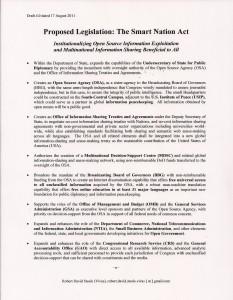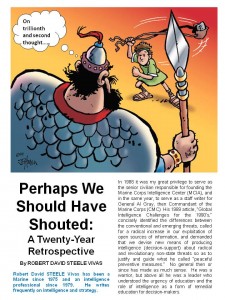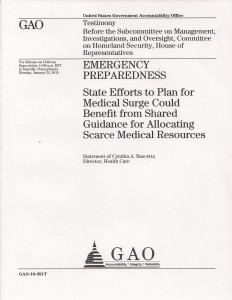
Venessa Miemis: GAO Slams Fed for Lack of Integrity
03 Economy, 09 Justice, 11 Society, Commercial Intelligence, General Accountability Office
From Senator Bernie Sanders, US Senator for Vermont
July 21, 2011
The first top-to-bottom audit of the Federal Reserve uncovered eye-popping new details about how the U.S. provided a whopping $16 trillion in secret loans to bail out American and foreign banks and businesses during the worst economic crisis since the Great Depression. An amendment by Sen. Bernie Sanders to the Wall Street reform law passed one year ago this week directed the Government Accountability Office to conduct the study. “As a result of this audit, we now know that the Federal Reserve provided more than $16 trillion in total financial assistance to some of the largest financial institutions and corporations in the United States and throughout the world,” said Sanders. “This is a clear case of socialism for the rich and rugged, you're-on-your-own individualism for everyone else.”
Among the investigation's key findings is that the Fed unilaterally provided trillions of dollars in financial assistance to foreign banks and corporations from South Korea to Scotland, according to the GAO report. “No agency of the United States government should be allowed to bailout a foreign bank or corporation without the direct approval of Congress and the president,” Sanders said.
Read the rest of this damning summary, and use link to full report….
Reference: The Fraud-Based US Economy
07 Other Atrocities, 08 Wild Cards, Analysis, Articles & Chapters, Blog Wisdom, Budgets & Funding, Collaboration Zones, Communities of Practice, Congressional Research Service, Corruption, Counter-Oppression/Counter-Dictatorship Practices, General Accountability Office, Intelligence (government), Journalism/Free-Press/Censorship, Methods & Process, Misinformation & Propaganda, Money, Banks & Concentrated Wealth, Office of Management and Budget, Officers Call, Policies, Power Behind-the-Scenes/Special Interests, Reform, Secrecy & Politics of Secrecy, Strategy, Waste (materials, food, etc)
The attached blog, “Failing to Prosecute Wall Street Fraud Is Extending Our Economic Problems,”
is a cut-and-paste accumulation of a variety of outlooks. Most are based on analyses or accumulated wisdom, but some appear based on hunches, ideologies, etc. Taken together, however, they paint a horrifying picture of the American political economy and our prospects for the future. Moreover, that picture does not change materially if you throw half of the pastings away. While the implications of fraud, per se, are clear, the horrifying picture of what is happening emerges when one tries to generalize on the description.
The anonymous guest author is telling us, in effect, that the neural network of our political-economy — i.e., the information system that provides the wherewithal for implicit and explicit homeostatic guidance and control – – has become so corrupted by fraud and disinformation that a pervasive atmosphere of confusion, menace, fear, mistrust, and alienation is breaking down the system into non-co-operative activities, thereby creating a kind of paralysis of will that, left unchecked, will prolong and deepen our economic crisis. <
One psychologist insightfully likened the situation to trauma and post traumatic stress disorder on a national scale.
Any student of Colonel Boyd's theory [1] of competition and conflict (Patterns of Conflict) and his idea of the OODA loop will immediately recognize the symptoms of confusion, menace, fear, mistrust, and alienation, expressed below. These are the emergent properties of decision cycles, or Observation – Orientation – Decision – Action (OODA) Loops, that have been folded back inside themselves and have become focused inward and are disconnected from their environments, but connected to some kind of internal dynamic that feeds on itself. Of course, Boyd was discussing military strategy and the art of winning by wrecking his adversary's OODA loops to undermine his adversary's organic cohesion, while preventing his adversary from doing the same thing to him.
Nevertheless, it would be a mistake to dismiss his ideas as applying only to the art of war. That is because Boyd's aim was to describe in a generalized sense how the human mind works in any conflict involving a clash of independent wills, what the mind's strengths and weaknesses are, and how these strengths and weaknesses play out in the competition that is the essence of life.
So, it should not be surprising that many politicians, businessmen, and scholars have recognized that Boyd's general ideas can be tailored to any kind of competition or game (just google “OODA loop”) and have sought gain by exploiting these ideas against others. Most people, however, instinctively evolve similar if less well defined ideas, because if Boyd's synthesis of the OODA loop is correct, these dynamics are innate in the evolved wiring of left and right hemispheres of our brains [2], and therefore will exhibit their outward manifestations in repetitive patterns in conflicts over time — which brings back to the tapestry of confusion, menace, fear, mistrust, and alienation and the counter weights that are necessary to overcome them.
Viewed through the lens of Boyd's theory of competition and conflict, the attached blog clarifies one question about the players in the economic game in particular: The information assembled below clearly shows who is the hoser and who is the hosee.
One final point, history has shown that once an nation's political-economic OODA loops become infected by the virus of corrupted information it is very very hard to clean it out. The hosing will continue unless ruthless action roots it out, otherwise, we will experience continued disintegration ending in a sudden collapse, like what happened to Rome on a grand time scale or to France's Third Republic [3] on a more tangible time scale.
With this background in mind, now read the attached blog and draw you own conclusions about what is needed to re-oreint the corrupted political-economic OODA loops that are leading America to ruin.
——————————–
NOTES:
[1] A short bio of Boyd and his theories as well as the briefing slides he used to explain his theories can be found in the Boyd folder here. Robert Coram's excellent biography of Boyd and his theories can be found here.
[2] See, for example, my analysis of how Barack Obama beat Hillary Clinton and John McCain here.
[3] William L. Shirer's Collapse of the Third Republic, is a case study in how the dry rot of inward focus in the 1930s set France up for its sudden collapse in during the German invasion of May 1940. His description of how the flow information among the military and political leaders became corrupted during the invasion is a microcosm of how inwardly focused OODA loops, lubricate by menace, mistrust, and fear result inevitably in the breakdown of cohesion, paralysis, chaos, and collapse.
——————————————————-
ATTACHED BELOW THE LINE IN FULL for Information Availability Assurance Into the Future
Failing to Prosecute Wall Street Fraud Is Extending Our Economic Problems
Posted By Guest Author On December 15, 2010 @ 8:30 am In Think Tank
The 19 most influential cybersecurity organizations in the world (GAO)
02 China, 06 Russia, Computer/online security, General Accountability Office
The Government Accountability Office identified 19 global organizations “whose international activities significantly influence the security and governance of cyberspace.”
The organizations range from information-sharing forums that are non-decision-making gatherings of experts to private organizations to treaty-based, decision-making bodies founded by countries. The groups address a variety of topics from incident response, the development of technical standards, the facilitation of criminal investigations to the creation of international policies related to information technology and critical infrastructure, the GAO stated.
From the GAO report:
- Asia-Pacific Economic Cooperation (APEC) is a cooperative economic and trade forum designed to promote economic growth and cooperation among 21 countries from the Asia-Pacific region. APEC's Telecommunication and Information Working Group supports security efforts associated with the information infrastructure of member countries through activities designed to strengthen effective incident response capabilities, develop information security guidelines, combat cybercrime, monitor security implications of emerging technologies, and foster international cybersecurity cooperation.
- Association of Southeast Asian Nations (ASEAN) is an economic and security cooperative comprised of 10 member nations from Southeast Asia. According to the 2009-2015 Roadmap for an ASEAN Community, it looks to combat transnational cybercrime by fostering cooperation among member-nations' law enforcement agencies and promoting the adoption of cybercrime legislation. In addition, the road map calls for activities to develop information infrastructure and expand computer emergency response teams (CERT) and associated drills to all ASEAN partners.
Continue reading “The 19 most influential cybersecurity organizations in the world (GAO)”
Reference: GAO on US State Emergency Preparedness
General Accountability OfficeSome journalists are observing that the US response to Haiti is starkly representative of the modest change in US emergency Preparedness since Katrina. Here are a few lessons from Haiti:
1. Get eyes on the ground immediately. Do not rely on the media for situational awareness (or the CIA or the Embassy, they are holed up and have no clue). Do the wide-area surveillance on day one.
2. Carpet-bomb the place with water, emergency rations, charcoal, plastic, light rope, and enough light lumber or rods to create shelter in a land without timber. NOTE: include enough water to cook the rations, don't assume water is available.
3. Have Peace Jumpers ready to go–mix of medical, military police, combat engineers, landing zone flight directors.
4. Have a mix of body registration photographers, body handlers, and deep ditch mass grave diggers with air-droppable equipment.
5. Do NOT try to micro manage from above instead use the military as a “core force” to assure mobility, communications, and general support to a massive influx of volunteer teams able to bring stabilization & reconstruction to one neighborhood at a time.
6. Start the flow of helicopters, landing craft, field hospitals, and water units on day one.
7. From Day One, create a global public understanding, in detail, of the situation on the ground, along with a Global to Local Range of Needs Table that can be updated using UNICEF's Rapid SMS as well as Twitter Support Networks.
Reference: Department of State Language Gaps
02 Diplomacy, General Accountability Office, Key Players, Methods & Process, Peace Intelligence, Tools
Phi Beta Iota: The Department of State (State), which should be the primary interface between the Republic, it's policy, acquisition, and operations communities, and the rest of the world, has fewer diplomats than the Department of Defense (DoD) has military musicians; and continues to suffer persistent staffing and foreign language gaps that “compromise diplomatic readiness” according to the General Accountability Office (GAO).
Continue reading “Reference: Department of State Language Gaps”
Journal: Global Information Grid 2.0 and Counting
Budgets & Funding, Collaboration Zones, Collective Intelligence, Communities of Practice, General Accountability Office, InfoOps (IO), Key Players, Policies, Strategy, Threats
In an era when changes to the Earth that used to take 10,000 years now take three;
In an era when all information in all languages all the time is the non-negotiable first step to achieving holistic understanding of the Earth's system of systems as well as all the chaotic sub-systems;
In an era when the Nordics are far ahead of everyone else in thinking about Multinational, Multiagency, Multidisciplinary, Multidomain Information-Sharing and Sense-Making (M4IS2),
it is helpful to have a sense of what the U.S. Department of Defense is going with respect to it's own Global Information Grid (GIG).
Below are a few headlines as well as pointers to a couple of devastatingly critical reviews from the General Accountability Office (GAO).
Phi Beta Iota has just one question: when, if ever, will DoD plan, program, budget, and implement for a world in which 96% of the information DoD needs to exploit is not secret, not in English, and not originating from a DoD device?
After the GAO reports, click on the Frog Left to read what we said to the National Research Council about the Army Communications Architecture in the early 1990's and Frog Right to read about our recommendations for National Information Infrastructure (NII) cyber-security in the mid-1990's.
DoD needs a Chief Knowledge Oficer (CKO)–someone that knows the difference between knowledge management, network management, content capture and exploitation, and the Holy Grail, organizational intelligence.
Continue reading “Journal: Global Information Grid 2.0 and Counting”


